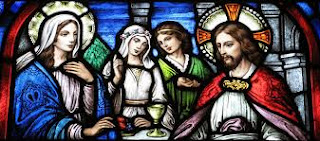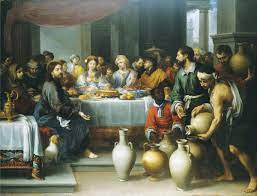The
Significance of Jesus’ first miracle: Why did He turn water into wine?
Jesus’
first recorded miracle on earth is found in the second chapter of St. John’s
gospel, verses 1to 11. It’s a curious case of divine intervention, turning
water into wine at a wedding feast, apparently to save the bridegroom from a
huge embarrassment. But is that all?
No
way. There’s lots more to the story.
The
Background
It’s
safe to assume the wedding was of a relative or friend of Mary’s since she’s
involved in the arrangements. The servants share the problem with her, that the
wine has run out.
-
Jesus has begun gathering disciples by now. He has 5 followers. Two, who had
followed John the Baptist: Andrew and John (Ref: John 1:35-37). Andrew’s
brother Simon Peter. Philip (whom Jesus finds and says simply: ‘Follow me’ John
1:43) and then Nathaniel, who responds to Philip’s call with the famous line:
‘Can anything good come out of Nazareth?’
I
find it interesting that Jesus doesn’t berate Nathaniel for his cynicism. On
the contrary, He declares that Nathaniel is a true Israelite and that ‘in him
there is no guile’. He immediately demonstrates His divine vision by telling
Nathaniel that He’d seen him sitting under a fig tree. This blows Nathaniel’s
mind and he responds: ‘Rabbi, thou art the Son of God…’ (John 1:49).
#I
feel this encounter demonstrates that God doesn’t get angry with honest doubt.
Remember Mary’s innocent query when the angel Gabriel announces that she’s
going to conceive a holy child? Mary asks: ‘How can this be, for I know not a
man?’ (Luke 1:34).
In contrast, when Zechariah receives an angelic message (from the same angel Gabriel) about becoming a father (he and Elizabeth were childless and pretty old) and puts forth a similar query: ‘How shall I know this? For I am an old man and my wife is advanced in years’ (Luke 1:19), the angel says he’ll remain mute until his child is born because he did not believe God’s words.
There
could be two explanations for the different responses of God’s angel to
Zechariah and Mary.
i)
As a priest, Zechariah was perhaps expected to display faith in God’s word.
Besides, he’d been beseeching the Lord for a child for many years. When his
fatherhood was announced, he could not believe it. Contrast this again with
Abraham, who was in a similar position (childless) when God announced that he’d
become the father of a great nation. Abraham believed God and it was credited
to him as righteousness! Clearly, God was displeased with Zechariah’s unbelief.
ii)
The angel strikes Zechariah mute so that he could not articulate any further
doubts! God knows our hearts. Perhaps Zach would’ve confessed doubt instead of
faith.
Now,
back to the wedding in Cana.
Mary
is already there. Jesus and his disciples are invited. The wine runs out and
Mary relays the problem to Jesus. His reply is rather gruff: ‘Woman, what does
this have to do with me? My hour has not yet come.’ (John 2:4). I’m sure the
Lord meant exactly that: His ministry hadn’t yet begun. But look at her
response: she says to the servants: ‘Do whatever he tells you.’
As
His mother, she knows His heart and knows He has the power to perform miracles!
What
does this episode reveal about the Lord?
a)
that when there’s a need, He responds;
b)
that He cares deeply about our respect in society. Running out of wine would’ve
been a huge social blunder for the bridegroom. It’s clear that in this context,
it was the bridegroom who was responsible for the arrangements. The ‘ruler of
the feast’ (or the Master of Ceremonies) takes the bridegroom aside and
compliments him on the excellent quality of the wine.
c)
God honours marriage
d)
God sanctions festivity and joy on good occasions. (Ref: ‘The joy of the Lord
is your strength’ Nehemiah 8:10; ‘Rejoice in the Lord, always and again I say, rejoice’ Philippians 4:4 and many other scriptures).
e)
400 years had elapsed since the Jews had seen a miracle. Daniel's era was
the last age of Jewish miracles. No wonder, therefore, that the simultaneous
appearance of a prophet like John the Baptist and a man who worked miracles like
Jesus attracted so much attention. People were stirred up and excited!
Also
reveals that God confirms His word by signs and wonders. The 5 disciples had
already committed their lives to Jesus. The miracle at Cana revealed His glory
and caused them to believe in Him.
f)
The miracle foreshadows Christ as the true bridegroom and the church as His
bride.
h)
Why did He use ceremonial washing jars?
These
were used for washing of hands and feet in deference to the Levitical law
(Leviticus 15:11). So, the water from the jars was usually for cleaning the
outside of the body.
#Jesus
replaced it with something on the inside.
i)
the fact that the new wine was better than the old wine symbolizes the new
covenant being better than the old. Moses’ first miracle turned water into
blood (Exodus 7:20). But Jesus’ first miracle turned water into precious wine!
j)
Great wine takes a long time to ferment. Jesus bypassed the entire time frame
in moments, revealing His authority over the laws of nature, the way He did
later by quieting the winds (Matthew 8:24-27) and by walking on water (Matthew
14: 23-27).
f)
Throughout the scriptures, wine is symbolic of God’s grace and our resultant
joy. It’s unnecessary for life. Its superfluity is a picture of God’s abundant
grace.
-
Our Lord makes the best wine without money or price (Isaiah 55:1-2)
It
is God’s nature to do abundantly more than we can ask or imagine!
Ref:
Jehovah Jireh: God is our provider. He shall supply all our needs according to
His riches in glory!


No comments:
Post a Comment